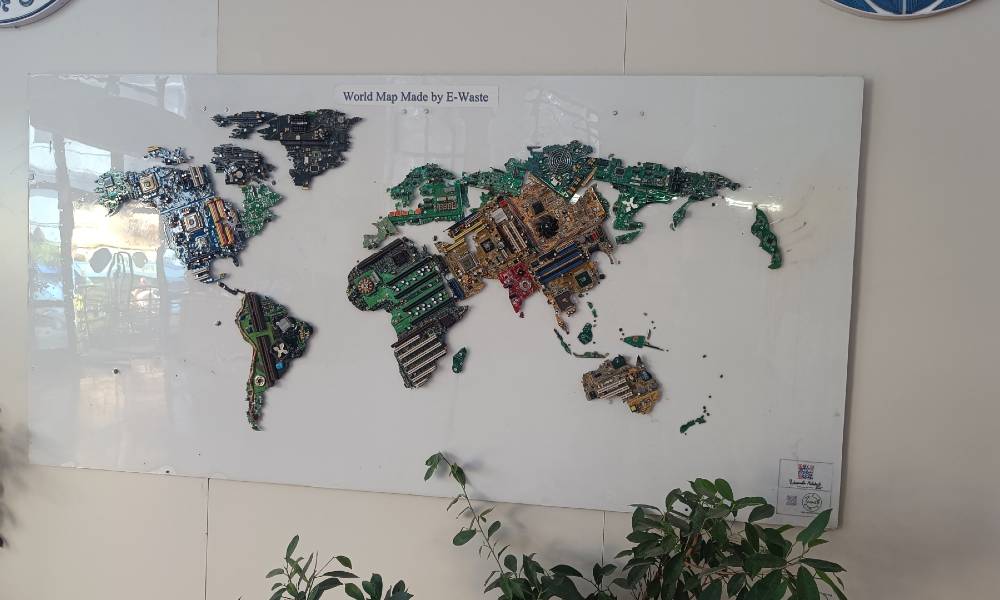Reports suggest that Bangalore is the third city in India which generates the most e-waste.
Electronic waste (e-waste) in Bangalore continues to go to the informal sector because the Bruhat Bengaluru Mahanagara Palike (BBMP) does not collect it from households, along with wet waste and dry waste, forcing residents to dispose of their old electronic devices where they can.
Karnataka State Pollution Control Board (KSPCB) officials acknowledged the lack of micro-level planning in electronic waste (e-waste) management in Bangalore.“ Currently there is no proper network to manage e-waste. E-waste management is only at macro-level in Bengaluru,” said an officer from KSPCB.
Murugan, a waste collector near Nallakamba agreed and said that the municipality collects paper and plastic waste, but not e-waste from waste collectors like him.
“They usually don’t collect e-waste from us. So, we give all the metal and e-waste to private companies, where they segregate and recycle it,” said Murugan.
Sudha, head teacher of Vivekananda Public School said that both the school and Vivekananda Institute of Technology (VKIT) write to the Pollution Control Board when they have a large amount of e-waste to be collected. “We send letters stating that we have old electronic devices. They then send specialists to check and collect them,” she said.

According to KSPCB, there are 20 e-waste collectors in the city. “The electronic wastes collected from educational institutions and other government offices are segregated as plastic and metal. They are then sent separately to plastic dealers and scrap dealers,” said an officer from KPSCB.
A report from Ministry of Electronics and Information Technology (MeitY) mentions that Bangalore is third among Indian cities in generating e-waste after Mumbai and Delhi.
National Solid Waste Association of India (NSWAI) report suggests that Bengaluru generates around 12,000 tons of e-waste per year.
Prabhu Krishna, a resident of Kumbalgodu said that he usually exchanges some of his old electronic devices, but sometimes he has no choice but to throw the old devices. “We don’t have any garbage vans coming around our houses,” he said.
Recently, there were reports of an e-waste dump near Bruhat Bengaluru Mahanagara Palike (BBMP) office in Yelahanka. However, the BBMP didn’t comment on this.
Praveen, Chief Engineer, BBMP said that e-waste is generated in small quantities. “Segregated e-waste collected by BBMP autos and trucks will be given to recyclers,” he said.
Saahas, a Non-Governmental Organization (NGO), which is dealing with e-waste management in the city pointed out that government and other private sectors should take more initiative in handling e-waste, and people should be made aware of segregation and disposal of e-waste. “E-waste should be disposed of with authorized bodies like the State Pollution Control Board and Central Pollution Control Board,” said Sateesh, project manager at Saahas.
Along with providing awareness, Saahas collects and channelizes e-waste from schools, colleges and government institutions to the recyclers.
The MeitY report shows that in India 95 percent of e-waste recycling is done in non-formal sector, and that the E-waste recycling in the non-formal sector by primitive methods could damage the environment.
United Nations Institute for Training and Research (UNITAR) defines electronic waste, or e-waste, as “all electrical and electronic equipment (EEE) and its parts that have been discarded by its owner as waste without the intent of re-use.”
World Health Organization (WHO) defines e-waste as the fastest growing solid waste stream in the world. According to WHO, if not treated, disposed, and recycled appropriately, e-waste can become a threat to the environment and to human health.
Dr. M. Lokeshwari, Environmental Engineering professor at RV College said that instead of dumping the e-waste, extraction of metals and recycling should be done. “Now-a-days with promotion of electronic medias and gadgets, more and more e-waste is generated. Solid waste management has become a very big issue in metro cities like Bengaluru,” she said.
Vikram Bhat, an Urban Planner said that micro and macro level planning, and e-waste centers should be in place to deal with electronic waste. “Bengaluru completely lacks proper e-waste management. More E-waste management centers should come up and BBMP should take more action regarding the matter,” he said. He also mentioned that special vehicles should be made exclusively for the collection of e-waste, especially hazardous materials like old batteries. Mr. Bhat suggested that each household or apartment should have a separate bin for collection of e-waste.



